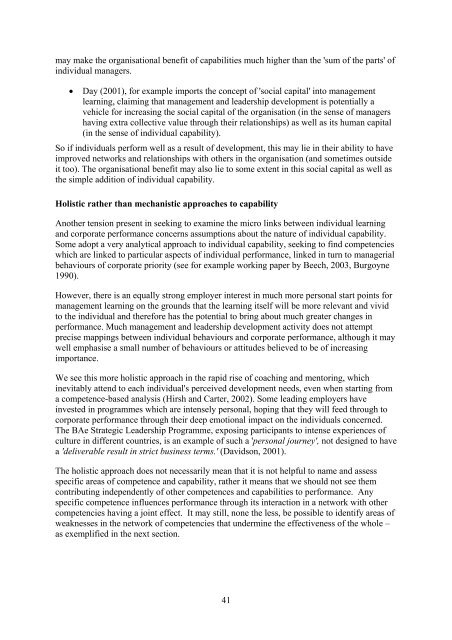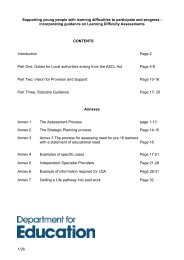The Development of Management and Leadership Capability and its ...
The Development of Management and Leadership Capability and its ...
The Development of Management and Leadership Capability and its ...
Create successful ePaper yourself
Turn your PDF publications into a flip-book with our unique Google optimized e-Paper software.
may make the organisational benefit <strong>of</strong> capabilities much higher than the 'sum <strong>of</strong> the parts' <strong>of</strong><br />
individual managers.<br />
• Day (2001), for example imports the concept <strong>of</strong> 'social capital' into management<br />
learning, claiming that management <strong>and</strong> leadership development is potentially a<br />
vehicle for increasing the social capital <strong>of</strong> the organisation (in the sense <strong>of</strong> managers<br />
having extra collective value through their relationships) as well as <strong>its</strong> human capital<br />
(in the sense <strong>of</strong> individual capability).<br />
So if individuals perform well as a result <strong>of</strong> development, this may lie in their ability to have<br />
improved networks <strong>and</strong> relationships with others in the organisation (<strong>and</strong> sometimes outside<br />
it too). <strong>The</strong> organisational benefit may also lie to some extent in this social capital as well as<br />
the simple addition <strong>of</strong> individual capability.<br />
Holistic rather than mechanistic approaches to capability<br />
Another tension present in seeking to examine the micro links between individual learning<br />
<strong>and</strong> corporate performance concerns assumptions about the nature <strong>of</strong> individual capability.<br />
Some adopt a very analytical approach to individual capability, seeking to find competencies<br />
which are linked to particular aspects <strong>of</strong> individual performance, linked in turn to managerial<br />
behaviours <strong>of</strong> corporate priority (see for example working paper by Beech, 2003, Burgoyne<br />
1990).<br />
However, there is an equally strong employer interest in much more personal start points for<br />
management learning on the grounds that the learning <strong>its</strong>elf will be more relevant <strong>and</strong> vivid<br />
to the individual <strong>and</strong> therefore has the potential to bring about much greater changes in<br />
performance. Much management <strong>and</strong> leadership development activity does not attempt<br />
precise mappings between individual behaviours <strong>and</strong> corporate performance, although it may<br />
well emphasise a small number <strong>of</strong> behaviours or attitudes believed to be <strong>of</strong> increasing<br />
importance.<br />
We see this more holistic approach in the rapid rise <strong>of</strong> coaching <strong>and</strong> mentoring, which<br />
inevitably attend to each individual's perceived development needs, even when starting from<br />
a competence-based analysis (Hirsh <strong>and</strong> Carter, 2002). Some leading employers have<br />
invested in programmes which are intensely personal, hoping that they will feed through to<br />
corporate performance through their deep emotional impact on the individuals concerned.<br />
<strong>The</strong> BAe Strategic <strong>Leadership</strong> Programme, exposing participants to intense experiences <strong>of</strong><br />
culture in different countries, is an example <strong>of</strong> such a 'personal journey', not designed to have<br />
a 'deliverable result in strict business terms.' (Davidson, 2001).<br />
<strong>The</strong> holistic approach does not necessarily mean that it is not helpful to name <strong>and</strong> assess<br />
specific areas <strong>of</strong> competence <strong>and</strong> capability, rather it means that we should not see them<br />
contributing independently <strong>of</strong> other competences <strong>and</strong> capabilities to performance. Any<br />
specific competence influences performance through <strong>its</strong> interaction in a network with other<br />
competencies having a joint effect. It may still, none the less, be possible to identify areas <strong>of</strong><br />
weaknesses in the network <strong>of</strong> competencies that undermine the effectiveness <strong>of</strong> the whole –<br />
as exemplified in the next section.<br />
41
















